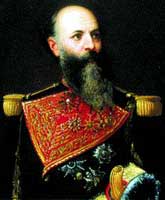- Antonio Guzmán Blanco
Infobox_President
name=Antonio Guzmán Blanco
small
order=25thPresident of Venezuela
term_start=April 27 ,1870
term_end=February 27 ,1877
predecessor=Guillermo Tell Villegas
successor=Francisco Linares
order2=28thPresident of Venezuela
term_start2=February 26 ,1879
term_end2=April 26 ,1884
predecessor2=José Gregorio Valera
successor2=Joaquín Crespo
order3=30thPresident of Venezuela
term_start3=September 15 ,1886
term_end3=August 8 1887
predecessor3=Joaquín Crespo
successor3=Hermógenes López
birth_date=birth date|1829|2|28|mf=y
birth_place=Caracas, Venezuela
death_date=death date and age|1899|7|28|1829|2|20|mf=y
death_place=Paris, France
party=Liberal Party
spouse=Ana Teresa Ibarra|
 |
|Antonio Guzmán Blanco (
Caracas ,February 28 ,1829 –Paris ,July 28 ,1899 ) wasPresident of Venezuela in three separate terms, from 1870 - 1877, from 1879 - 1884, and from 1886 - 1887.Guzmán's father
Antonio Leocadio Guzmán was a Venezuelan journalist, politician and founder of the Liberal Party. The son was banished by the government of General Castro, and accompanied GeneralJuan Crisóstomo Falcón in his invasion of Venezuela, becoming his general secretary. After the final defeat of Falcón at Cople in September, 1860, Guzmán accompanied his chief in his flight, and was sent to the West Indies to solicit assistance. Toward the end of 1861 he landed again with Falcón on the coast of Coro, and after numerous engagements signed onMay 22 ,1863 , the treaty of Coche, by which arms were laid down, and a general assembly called at Victoria, which elected Falcón president and Guzmán vice president. The latter was at the same time secretary of the treasury, and went to London to negotiate a loan.On his return he was for a short time in charge of the executive, and afterward was elected president of congress. After the overthrow of Falcón in 1868, Guzmán left the country, but headed a revolution in 1869, and in 1870 became provisional president with extraordinary powers, ruling the country for seven years as a dictator. His successor, General
Francisco Linares Alcántara , died in office in December, 1878, and there were several revolutionary uprisings, till Guzmán assumed the government again. In the elections of 1883 GeneralJoaquín Crespo , one of his friends, was declared president, and Guzmán became ambassador to France, living with great ostentation in Paris. In 1886 he again assumed the presidency; his successor, the undistinguishedHermógenes López , was also understood to be under his influence.The autocratic nature of Guzmán's regimes contrast sharply with the many economic and legal reforms and achievements that they brought about. His government was responsible for the creation of the modern currency (
Bolivar ), the restoration of the national anthem, the second national census, the railroad betweenCaracas andLa Guaira , the foundation of the Venezuelan Academy of the Language, the telephone service between Caracas and La Guaira, promotion of agriculture and education (Decree of Public and Obligatory Instruction of 1870), stimulus to commerce, and important public works (the National Pantheon, the Capitol, and the Municipal Theater, among others.)Also a distinguished
freemason , he sharply reduced the power of theRoman Catholic Church inVenezuela while in office.See also
*
Venezuela
*Presidents of Venezuela References
*
Wikimedia Foundation. 2010.
